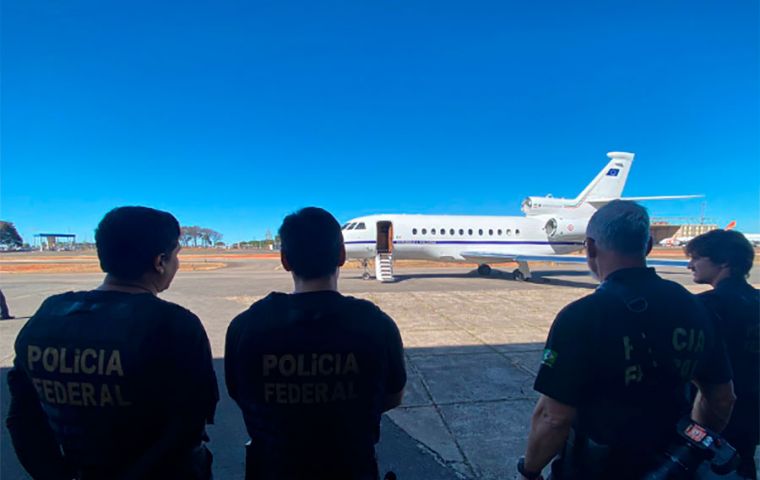MercoPress. South Atlantic News Agency
Fugitive mafia boss Rocco Morabito extradited from Brazil to Italy
 On the run for 23 years, Morabito was first arrested in Uruguay following a squabble with his wife in a Montevideo hotel
On the run for 23 years, Morabito was first arrested in Uruguay following a squabble with his wife in a Montevideo hotel Rocco Morabito, a convicted Italian drug lord linked to the ‘Ndrangheta mafia, has been successfully extradited from Brazil to Italy, accompanied by Italian law enforcement officers belonging to the Interpol Cooperation Against ‘Ndrangheta (I-CAN) project.
Morabito is considered a top international drug broker and one of the most wanted fugitives in the world, according to the Italian Ministry of Interior. The extradition follows intensive cooperation between the Interpol National Central Bureaus (NCBs) in Brazil and Italy.
Arrested in Brazil in March 2021 through a joint operation between the Brazilian Federal Police and the Italian Carabinieri with support from INTERPOL, Morabito had spent 23 years on the run from Italian justice, which sentenced him to 30 years in prison.
Morabito was previously set to be extradited from Uruguay after he was arrested in the country in a 2017 operation led by the Italian Carabinieri’s Special Operation Division and Investigative Unit. In 2019, however, he escaped from prison and an INTERPOL Red Notice was issued against him.
Morabito lived some fifteen years as a respectable citizen, and 'businessman', at the Uruguayan seaside resort of Punta del Este with his wife and children, who attended a local private school.
However in a trip to Montevideo he squabbled with his wife in a hotel and was arrested by the police suspecting fake documents. He was then sentenced, and ready for extradition, when surprisingly he managed to escape from the Uruguayan Police HQ in downtown Montevideo, 'jumping' to a neighboring flat. Three jail mates who also escaped were recaptured in 48 hours but Morabito never reappeared until news of his arrest in Brazil.
An ongoing investigation as to how Morabito managed to escape has yet to identify most certainly members of the same police, collaborators of the “inside job” which helped him “jump” to the neighboring flat.
The fact is that during the last ten years of the opposition catch all coalition Broad Front government the ministry of Interior, or Home Office, from which depends the police was under the command of minister Eduardo Bonomi, one of the closest advisors of ex president Jose Mujica. Despite the seriousness of the event, and demands from Parliament, and Italian authorities, Bonomi refused to resign.
“The extradition of Rocco Morabito sends a powerful message: however strong the criminal web of mafia groups may be, our global police network is stronger,” said Giovanni Bombardieri, Chief Prosecutor of the Antimafia Prosecution Office of Reggio Calabria.
“‘Ndrangheta operatives leverage immense financial resources to avoid facing justice, but by mobilizing law enforcement through INTERPOL, we will find them and ensure they account for their actions in the end.”
Arresting individuals linked to the ‘Ndrangheta is a core goal of the I-CAN project, which has already helped arrest more than 25 fugitives around the world since its launch in 2020.
With origins in the Italian region of Calabria, the ‘Ndrangheta is considered Italy’s most extensive and powerful mafia group, with activities on every continent and strong ties to the trade in cocaine bound for Europe from South America.
“The ‘Ndrangheta are not just an Italian issue; they represent a global threat and have exploited links with organized crime groups in South America to enrich themselves,” said Márcio Nunes de Oliveira, Director General of the Brazilian Federal Police. “This criminal war chest is then reinvested in an array of legitimate and illegal activities, further polluting the global economy.”
Brazil is one of 13 countries participating in INTERPOL’s I-CAN project, connecting specialized police units across borders to share intelligence and partner on operations to combat the ‘Ndrangheta.
Funded by the Italian Department of Public Security, the I-CAN project raises global awareness and understanding about the ‘Ndrangheta and their modus operandi, turning intelligence into arrests and dismantling their networks and operations.




Top Comments
Disclaimer & comment rulesCommenting for this story is now closed.
If you have a Facebook account, become a fan and comment on our Facebook Page!